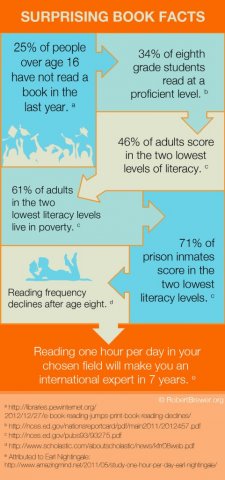A friend shared this on Facebook. (Click to enlarge; you'll see later why I want to keep it small.)
I'm not criticizing the sharer, nor the original post, because the ideas this image suggests are valid. But I was inspired mostly to comment and to ask questions, beginning with: Where do these facts come from? I'm not going to answer that one yet, because what I found pretty much makes my other comments unnecessary, and I like them, so I'm going to give them first.
- Since approximately two-thirds of high school graduates attend college (and therefore presumably read some books), this implies that the people who don't graduate from high school but later enjoy reading are very rare. Whether or not it's true, it makes sense for the here-and-now, though not in other times and places.
- That forty-two percent of college graduates never touch a book again I find less believable. This is a population that presumably enjoys learning—unless they went to college solely because they bought into the fallacious idea that it would guarantee them high-paying jobs.
- Fifty-seven percent of new books are not read to completion? Hmmm. I suspect that 57% of new books aren't actually worth reading to completion, so I'm not sure this is a bad thing.
- Define "been in a bookstore." I've read 67 books so far this year, but I can't tell you the last time I was in a bookstore. When they closed our local Borders, that pretty much sealed my relationship with Amazon.com. Even before that, the local bookstores almost never had the books I was looking for. Now if they asked me how often I've been in a library in the past five years, that would be an entirely different story.
- Define "buy a book." Does that mean only physical books? If so, it's disingenuous to leave out e-books. Likewise, buying a book is not a particularly lofty goal in my mind (though I've spent a fortune on them); I'm a big fan of libraries. On the other hand, this statistic says that 80% of families did not buy or read a book. So there's another question:
- Define "family." There are about 50 million children in American public elementary and secondary schools, which is more than 15% of the entire population, and a much greater percentage of "families" of even the most generous definition (i.e. including any two or more people living together, with or without children). And it ignores all students in private and home schools, as well as college students. No matter what they do at home, each of these students must have in the last year read not just one but several books (or been read to, for the non-readers). So even stretching the definitions out of all reality, I can't make sense out of the 80% figure.
- And the last one? Reading an hour a day in one field makes you an expert in seven years? I wish! Seven years times 365 days per year is a mere 2,555 hours of reading.
Okay, I've said all that because that's what's currently going around Facebook. But my first attempt at investigation—from squinting at the fine print at the bottom—led me to this page on Robb Brewer's website. There he abjurs "any and all connection" to the statistics in the original graphic, and requests that if people are going to publish it, they use this one instead (again, clicking will enlarge the image):
I didn't check these statistics, because Mr. Brewer clearly did. Except for the last one, which he kept for its feel-good value.
And yes, I had a thousand better things to do than critique a Facebook graphic. OCD takes many forms.




